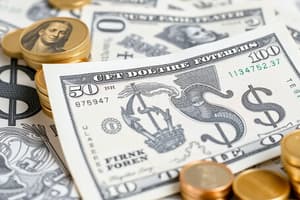Podcast
Questions and Answers
What is expected to happen to the confidence in currency during the upcoming financial crisis?
What is expected to happen to the confidence in currency during the upcoming financial crisis?
- It will remain stable.
- It will drastically increase.
- It will fluctuate moderately.
- It will collapse. (correct)
According to the content, where do people tend to revert in times of financial crisis?
According to the content, where do people tend to revert in times of financial crisis?
- Real estate assets
- Gold and silver (correct)
- Digital currencies
- Investments in bonds
What is said to be the greatest wealth transfer in history expected to occur during this decade?
What is said to be the greatest wealth transfer in history expected to occur during this decade?
- A change from stocks to real estate investments.
- A transition within the financial market sector.
- A shift from urban to rural assets.
- A transfer resulting from a global financial crisis. (correct)
What does the speaker assert is the best investment one can make?
What does the speaker assert is the best investment one can make?
Who quoted that 'the further you look into the past, the further you can see into the future'?
Who quoted that 'the further you look into the past, the further you can see into the future'?
What significant event occurred in the speaker's experience with a financial planner?
What significant event occurred in the speaker's experience with a financial planner?
What motivates the speaker to dive into studying the financial markets?
What motivates the speaker to dive into studying the financial markets?
Who are the advocates concerned with trade deficits and budget deficits, as mentioned in the content?
Who are the advocates concerned with trade deficits and budget deficits, as mentioned in the content?
What is the first stage of the seven stages of empire as described?
What is the first stage of the seven stages of empire as described?
What event marks Stage four in the cycle of empires?
What event marks Stage four in the cycle of empires?
What ultimately happens to debased currencies according to the cyclical pattern described?
What ultimately happens to debased currencies according to the cyclical pattern described?
What is a consequence of deficit spending as discussed in the content?
What is a consequence of deficit spending as discussed in the content?
How does Gresham's Law relate to the management of currency?
How does Gresham's Law relate to the management of currency?
What is indicated by the statement regarding the monetary system transferring wealth?
What is indicated by the statement regarding the monetary system transferring wealth?
What historical comparison is made to current events in Greece?
What historical comparison is made to current events in Greece?
What historical period does the discussion about the worthlessness of copper coinage reference?
What historical period does the discussion about the worthlessness of copper coinage reference?
What was the claim regarding the currency in the United States before World War I?
What was the claim regarding the currency in the United States before World War I?
What major event led to the cessation of gold redemption rights for currencies?
What major event led to the cessation of gold redemption rights for currencies?
What was the reserve ratio established under the Federal Reserve Act of 1913 in the United States?
What was the reserve ratio established under the Federal Reserve Act of 1913 in the United States?
How did European countries settle their debts to the United States during World War I?
How did European countries settle their debts to the United States during World War I?
What did the United States' economy transform into during both World Wars?
What did the United States' economy transform into during both World Wars?
When did the United States start to send troops into World War II?
When did the United States start to send troops into World War II?
What effect did stopping gold redemption rights have on currency spread?
What effect did stopping gold redemption rights have on currency spread?
What transaction principle allowed the Federal Reserve to issue more claims than gold value?
What transaction principle allowed the Federal Reserve to issue more claims than gold value?
What has been a consistent element historically for societies over the last 5,000 years?
What has been a consistent element historically for societies over the last 5,000 years?
What is the primary concern regarding national currencies as mentioned?
What is the primary concern regarding national currencies as mentioned?
What does the speaker believe is essential for small investors?
What does the speaker believe is essential for small investors?
How does the speaker describe the physiological response of humans?
How does the speaker describe the physiological response of humans?
Which time frame does the speaker suggest one should consider to understand patterns in history?
Which time frame does the speaker suggest one should consider to understand patterns in history?
What is contrasted with modern society's focus according to the speaker?
What is contrasted with modern society's focus according to the speaker?
What is a major challenge for humans in learning from history as posed in the content?
What is a major challenge for humans in learning from history as posed in the content?
What does the speaker imply is the outcome of ignoring historical trends?
What does the speaker imply is the outcome of ignoring historical trends?
What was the approximate U.S. national income in 1943?
What was the approximate U.S. national income in 1943?
What was the primary reason for the establishment of the Bretton Woods system?
What was the primary reason for the establishment of the Bretton Woods system?
How much gold was the U.S. dollar backed by under the Bretton Woods system?
How much gold was the U.S. dollar backed by under the Bretton Woods system?
What economic effect did the Bretton Woods system have on foreign currencies?
What economic effect did the Bretton Woods system have on foreign currencies?
What is the first stage of the seven stages of empire?
What is the first stage of the seven stages of empire?
What economic condition did the U.S. face following extensive deficit spending for military engagements and social programs?
What economic condition did the U.S. face following extensive deficit spending for military engagements and social programs?
What economic event led to a lack of understanding about gold among newer generations?
What economic event led to a lack of understanding about gold among newer generations?
What was a consequence of the U.S. having a large portion of the world's monetary gold post-World War II?
What was a consequence of the U.S. having a large portion of the world's monetary gold post-World War II?
Which historical development is associated with Athens' prosperity?
Which historical development is associated with Athens' prosperity?
What concern did Charles de Gaulle express regarding the U.S. dollar in the 1960s?
What concern did Charles de Gaulle express regarding the U.S. dollar in the 1960s?
What has been a recurring monetary system timeline in history?
What has been a recurring monetary system timeline in history?
What myth regarding war and the economy is mentioned in the content?
What myth regarding war and the economy is mentioned in the content?
Which stage follows the debasement of currency in the seven stages of empire?
Which stage follows the debasement of currency in the seven stages of empire?
What major event removed the gold standard from the international financial system?
What major event removed the gold standard from the international financial system?
What concept explains why bad money drives out good money?
What concept explains why bad money drives out good money?
Which factors have contributed to the current understanding of currency debasement among scholars?
Which factors have contributed to the current understanding of currency debasement among scholars?
Flashcards
Deflationary Crash
Deflationary Crash
A significant decline in the value of currencies worldwide, leading to a lack of confidence in traditional monetary systems.
Return to Gold and Silver
Return to Gold and Silver
The return to gold and silver as a form of currency during periods of economic instability. Often seen as a safe haven during times of financial turmoil.
Wealth Transfer
Wealth Transfer
The transfer of wealth from one group to another. Often happens during periods of economic crisis.
Financial Education
Financial Education
Signup and view all the flashcards
Financial Manipulation
Financial Manipulation
Signup and view all the flashcards
Looking into the Past
Looking into the Past
Signup and view all the flashcards
Hard Money Advocate
Hard Money Advocate
Signup and view all the flashcards
Gold Community
Gold Community
Signup and view all the flashcards
Seven Stages of Empire
Seven Stages of Empire
Signup and view all the flashcards
Gresham's Law
Gresham's Law
Signup and view all the flashcards
Fiat Currency
Fiat Currency
Signup and view all the flashcards
Deficit Spending
Deficit Spending
Signup and view all the flashcards
Debasing Currency
Debasing Currency
Signup and view all the flashcards
Military Expansion
Military Expansion
Signup and view all the flashcards
Monetary System Shift
Monetary System Shift
Signup and view all the flashcards
Satellite State
Satellite State
Signup and view all the flashcards
Gold Standard
Gold Standard
Signup and view all the flashcards
Gold-backed currency
Gold-backed currency
Signup and view all the flashcards
Printing more currency than gold
Printing more currency than gold
Signup and view all the flashcards
Suspension of gold redemption
Suspension of gold redemption
Signup and view all the flashcards
Gold Exchange Standard
Gold Exchange Standard
Signup and view all the flashcards
Reserve Ratio
Reserve Ratio
Signup and view all the flashcards
Impact of WWI & WWII on the gold standard
Impact of WWI & WWII on the gold standard
Signup and view all the flashcards
U.S. gold gains during WWI & WWII
U.S. gold gains during WWI & WWII
Signup and view all the flashcards
Bretton Woods System
Bretton Woods System
Signup and view all the flashcards
Printing Dollars
Printing Dollars
Signup and view all the flashcards
War is good for the Economy
War is good for the Economy
Signup and view all the flashcards
Recency Bias
Recency Bias
Signup and view all the flashcards
The Gold Standard
The Gold Standard
Signup and view all the flashcards
Learning from History
Learning from History
Signup and view all the flashcards
Study Notes
USA's Seven Stages of Empire - Hidden Secrets of Money Episode 2
- Wealth transfer is inevitable during financial crises, impacting currency systems.
- History demonstrates wealth transitions from crisis to opportunity.
- Educating oneself is crucial for navigating economic shifts.
- Monetary history repeats, showing predictable patterns.
- Gold and silver have been dominant currencies for approximately 5,000 years.
Monetary History and the Athenian Empire
- Athens, an early democracy, held a free market society.
- Their advanced architecture and engineering reflected prosperity.
- The Peloponnesian Wars led to Athenian decline.
- Excessive spending, military conflict, and monetary debasement contributed to their downfall.
- These recurring issues highlight historical patterns of decline.
Monetary History and the Modern World
- The 20th century saw a shift from gold and silver-backed currencies to fiat currencies.
- The US dollar lost its convertibility to gold.
- The Bretton Woods system, established post-World War II, aimed to create a stable global monetary system.
- However, the system eventually collapsed due to US deficit spending.
- History demonstrates consistent patterns of economic and monetary systems' fluctuations.
The Seven Stages of Empire
- The speaker describes a cyclical pattern of seven stages, repeating across history.
- The cycle begins with sound money and ends with economic collapse due to overspending, wars, and currency debasement.
- The modern world follows a similar pattern, mirroring historical crises.
- The speaker emphasizes the importance of understanding repeating patterns of empires.
Studying That Suits You
Use AI to generate personalized quizzes and flashcards to suit your learning preferences.




